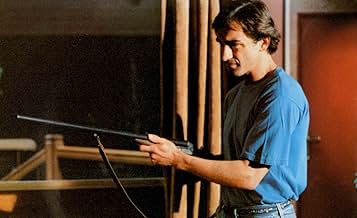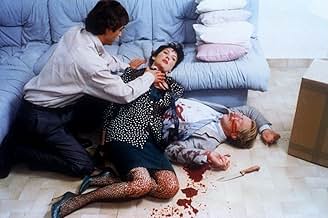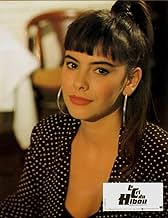NOTE IMDb
6,3/10
1,1 k
MA NOTE
Après la séparation de sa femme, Robert s'installe à Vichy où il observe la belle Juliette. Son fiancé Patrick devient jaloux et attaque Robert. Lorsque Patrick disparaît, Robert est soupçon... Tout lireAprès la séparation de sa femme, Robert s'installe à Vichy où il observe la belle Juliette. Son fiancé Patrick devient jaloux et attaque Robert. Lorsque Patrick disparaît, Robert est soupçonné de l'avoir tué.Après la séparation de sa femme, Robert s'installe à Vichy où il observe la belle Juliette. Son fiancé Patrick devient jaloux et attaque Robert. Lorsque Patrick disparaît, Robert est soupçonné de l'avoir tué.
- Réalisation
- Scénario
- Casting principal
- Récompenses
- 1 victoire et 1 nomination au total
Avis à la une
I had wanted to buy this one for a long time, but repeatedly postponed it due to the excessive price-tag of the DVD and the criticism leveled at the quality of the transfer (which was decent to my eyes even on a 40" TV monitor, if somewhat dark and with the burnt-in subtitles being intrusively large and bafflingly situated towards the middle of the screen!). Anyway, I eventually took the plunge not too long ago and am extremely glad I did – what with the accompanying Audio Commentary alone proving value for money!
The film is a well-regarded effort from Chabrol's middle period, given added prestige by being adapted from the work of celebrated crime novelist Patricia Highsmith. Incidentally, it makes for an excellent example of the director's admiration for Alfred Hitchcock (who had himself brought Highsmith's STRANGERS ON A TRAIN to the screen back in 1951), building suspense and goading the audience into complicity in much the same way as the acknowledged master of the form – though the noir trappings of the narrative (and, by extension, the expressionistic quality of the cinematography here) actually derives from Fritz Lang, another strong influence.
The plot – reportedly, a very faithful rendition of the novel – seems simple enough at first: a slightly disturbed man (about to be divorced) spies on a beautiful neighbor and, when he finally confronts her, realizes that she is herself essentially unbalanced (being willing to drop her current boyfriend and take up with him!); in this regard, the film reminded me a good deal of PRETTY POISON (1968). However, things get complicated when the boyfriend proves both jealous (though the male protagonist never actually consummates the affair!) and violent (even if he has to be saved from drowning himself when the situation comes to a head!), and even more so when the hero's malicious ex-wife becomes involved.
Interestingly, when the boyfriend goes missing, not only is his 'rival' suspected by the Police but, in a delicious reversal of Chabrol's own LA FEMME INFIDELE (1968), the girl rejects rather than endorses him – to the point that she tragically takes her own life (the panoramic shot revealing her lifeless body amid the tall grass is a brilliant touch). Surprisingly, the latter stages turn into outright black comedy as the boyfriend's repeated bungled attempts on the hero's life leave many of those around him lying in a pool of blood – including the boyfriend himself and the ex-wife in the astounding climax (capped by an ambiguous freeze-frame which leaves the protagonist's destiny hanging in the balance).
Another definite asset here is the well-chosen cast: while I was familiar with Mathilda May as the volatile heroine (best-known for playing the nude space vampire of Tobe Hooper's LIFEFORCE [1985] but who also had an important supporting role in Chabrol's recent A GIRL CUT IN TWO [2007]) and vaguely aware of Jean-Pierre Kalfon (portraying the bemused cop on the case), perhaps the most impressive was Christophe Malavoy in the central part (who proving a veritable magnet for disaster likens him with the lead character of Luis Bunuel's delightful 'non-serial killer' black comedy, THE CRIMINAL LIFE OF ARCHIBALDO DE LA CRUZ [1955]!). This analogy is also mentioned in the Audio Commentary featuring one Ric Menello and David Kalat (President of All Day Entertainment, which released the DVD) who provide a comprehensive, scholarly yet entertaining analysis of the film, its tortuous distribution background, as well as a broad look at Chabrol's prolific career.
The film is a well-regarded effort from Chabrol's middle period, given added prestige by being adapted from the work of celebrated crime novelist Patricia Highsmith. Incidentally, it makes for an excellent example of the director's admiration for Alfred Hitchcock (who had himself brought Highsmith's STRANGERS ON A TRAIN to the screen back in 1951), building suspense and goading the audience into complicity in much the same way as the acknowledged master of the form – though the noir trappings of the narrative (and, by extension, the expressionistic quality of the cinematography here) actually derives from Fritz Lang, another strong influence.
The plot – reportedly, a very faithful rendition of the novel – seems simple enough at first: a slightly disturbed man (about to be divorced) spies on a beautiful neighbor and, when he finally confronts her, realizes that she is herself essentially unbalanced (being willing to drop her current boyfriend and take up with him!); in this regard, the film reminded me a good deal of PRETTY POISON (1968). However, things get complicated when the boyfriend proves both jealous (though the male protagonist never actually consummates the affair!) and violent (even if he has to be saved from drowning himself when the situation comes to a head!), and even more so when the hero's malicious ex-wife becomes involved.
Interestingly, when the boyfriend goes missing, not only is his 'rival' suspected by the Police but, in a delicious reversal of Chabrol's own LA FEMME INFIDELE (1968), the girl rejects rather than endorses him – to the point that she tragically takes her own life (the panoramic shot revealing her lifeless body amid the tall grass is a brilliant touch). Surprisingly, the latter stages turn into outright black comedy as the boyfriend's repeated bungled attempts on the hero's life leave many of those around him lying in a pool of blood – including the boyfriend himself and the ex-wife in the astounding climax (capped by an ambiguous freeze-frame which leaves the protagonist's destiny hanging in the balance).
Another definite asset here is the well-chosen cast: while I was familiar with Mathilda May as the volatile heroine (best-known for playing the nude space vampire of Tobe Hooper's LIFEFORCE [1985] but who also had an important supporting role in Chabrol's recent A GIRL CUT IN TWO [2007]) and vaguely aware of Jean-Pierre Kalfon (portraying the bemused cop on the case), perhaps the most impressive was Christophe Malavoy in the central part (who proving a veritable magnet for disaster likens him with the lead character of Luis Bunuel's delightful 'non-serial killer' black comedy, THE CRIMINAL LIFE OF ARCHIBALDO DE LA CRUZ [1955]!). This analogy is also mentioned in the Audio Commentary featuring one Ric Menello and David Kalat (President of All Day Entertainment, which released the DVD) who provide a comprehensive, scholarly yet entertaining analysis of the film, its tortuous distribution background, as well as a broad look at Chabrol's prolific career.
After divorcing his easy wife Véronique (Virginie Thévenet), the designer Robert (Christophe Malavoy) moves from Paris to Vichy. Depressed, he walks for three months to the lawn of the gorgeous Juliette Voland (Mathilda May) during the night to see her cooking. One night, her fiancé Patrick Soulage (Jacques Penot) has traveled, and Juliette meets Robert at the lawn and invites him to drink a coffee with her in her house. Robert visits her again and Juliette has a crush on him. She confides him that she is afraid of death since her brother died when he was eight years old. She dumps Patrick and stalks Robert, and Patrick believes they have a love affair. One night, Patrick forces Robert to stop the car on the road and they fight. Robert leaves the beaten Patrick near the river margin. On the next morning, Patrick disappears, and Robert goes with Juliette to the police to report what happened. But soon Veronique decides to play tricks and gives false information to the incompetent chief of police of Vichy. Soon the personal and professional life of Robert is affected by the accusations of murder, affecting also the life of Juliette that questions whether Robert is guilty.
"Le cri du hibou", a.k.a. "The Cry of the Owl" (1987), is a movie by Claude Chabrol with strange characters in an absurd story. Robert is a shy and weirdo, who meets the gorgeous Juliette without any interest in sex. His attitudes are strange, and he looks like a suspect without any guilt. Juliette is naive and stalks him even when the man says that is not interested on her. Patrick is a sick man, and what he does to Robert is inadmissible. The police of Vichy and the chief of police are incompetent. Véronique is a bit*ch, and in the conclusion, she loses the wealthy Marcello, who is a coward, and has the end she deserves. Suzie is another disgusting character. The usual open end this time does not work. My vote is six.
Title (Brazil): "O Grito da Coruja" ("The Cry of the Owl")
"Le cri du hibou", a.k.a. "The Cry of the Owl" (1987), is a movie by Claude Chabrol with strange characters in an absurd story. Robert is a shy and weirdo, who meets the gorgeous Juliette without any interest in sex. His attitudes are strange, and he looks like a suspect without any guilt. Juliette is naive and stalks him even when the man says that is not interested on her. Patrick is a sick man, and what he does to Robert is inadmissible. The police of Vichy and the chief of police are incompetent. Véronique is a bit*ch, and in the conclusion, she loses the wealthy Marcello, who is a coward, and has the end she deserves. Suzie is another disgusting character. The usual open end this time does not work. My vote is six.
Title (Brazil): "O Grito da Coruja" ("The Cry of the Owl")
M. Chabrol has done a strong, creditable job of transferring the powerfully discomforting world of Patricia Highsmith to the screen. Highsmith's characters become moral monsters through a condition of absolute confidence in their own warped psyches. These characters never learn, or understand themselves. Their lies to each other are absolute because they lie to themselves absolutely. No cliché goes unpunished. Characters become moral monsters without losing their sense of rightness. They seem powerless not to act in self-destructive ways.
The film is not equal to "Strangers on a Train" or "Purple Noon," other adaptations of Highsmith's work. But it is faithful in spirit to a novel which is itself not equal to the literary sources of these films. See it with an open mind and revel in the creepiness. Chabrol is a sufficiently great artist to allow another great artist her night cry.
The film is not equal to "Strangers on a Train" or "Purple Noon," other adaptations of Highsmith's work. But it is faithful in spirit to a novel which is itself not equal to the literary sources of these films. See it with an open mind and revel in the creepiness. Chabrol is a sufficiently great artist to allow another great artist her night cry.
Patricia Highsmith created one fascinating character in her novel: Nickie, the ex-wife of Robert Forester, here called Veronique. Virginie Thevenet plays her and she is terrific. Seductive, lying, violent and completely fascinating, she is the one thing in the movie that really works. Malavoy acts like a Boy Scout troop leader, May is dull and lifeless and Kalfon is hard to believe as a detective. Only Penot as the beefy handsome coward Soulages manages to rise to Thevenet's level.
Chabrol was known for his cold, passionless thrillers; you went to them out of a sense of duty. Wasn't he after all one of the founding members of the New Wave? See it if it turns up on late night TV, and there's nothing else to watch.
This Chabrol movie seems to be almost forgotten - given the few comments printed here and given the fact that it's unlikely to be mentioned among the maestros masterpieces. Even though it is based on a novel by Patricia Highsmith, and has some degree of tension in it, "Le Cri du Hibou" doesn't really draw the viewer inside the small world of it's handful of characters. Everyone in this film seems to have his private neurosis, and when fate bonds them all together, an explosive mixture is the result. Unfortunately (and unusually for Chabrol) the narration is not clever enough to tantalize the viewer. Instead, quite a bunch of implausible elements make it hard to enjoy the unfolding of the story. Then again, since it is the story of a man regarded as threat by his surrounding without ever wanting to threat anyone, a man seen as guilty without guilt (or is there guilt at his hands?), Chabrol had to avoid all too much realism. An ultra-realistic view at the same story would stop at 40 minutes; it would not be able to display the ideas driving the characters to their deeds like Chabrol does. Seen through this perspective, the film is quite an interesting statement.
Le saviez-vous
- AnecdotesOne of two adaptations of Patricia Highsmith's novel "The Cry of the Owl" that was released the same year, the other adaptation is Der Schrei der Eule (1987).
- ConnexionsVersion of Der Schrei der Eule (1987)
Meilleurs choix
Connectez-vous pour évaluer et suivre la liste de favoris afin de recevoir des recommandations personnalisées
- How long is The Cry of the Owl?Alimenté par Alexa
Détails
Contribuer à cette page
Suggérer une modification ou ajouter du contenu manquant




























